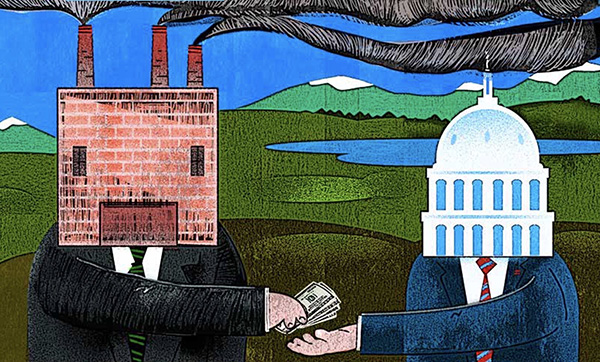
Why do corporations make political donations? One obvious answer is to gain influence with politicians whose actions can benefit the firm, but the ways and extent to which campaign contributions impact firm value are still being studied.
In a forthcoming paper, Amanda Heitz, assistant professor of finance, investigates the relationship between campaign contributions and firm value from a new angle. Heitz and her co-authors analyzed nearly 40 years of regulatory activity by the Environmental Protection Agency and found that politically connected firms experience fewer enforcement actions and receive smaller regulatory fines than similar unconnected firms.
“To the best of our knowledge, this is the first study that provides systematic evidence that firms making campaign contributions to politicians obtain favorable enforcement by the EPA,” Heitz says.
The study focuses on EPA regulation of the Clean Air Act, the 1963 law that limits gas emissions from vehicles and industrial plants. Due to the agency’s limited resources and the sheer number of firms subject to regulation, the EPA has substantial discretion in determining the firms it investigates and takes enforcement actions against as well as the amount of fines levied for regulatory violations.
While politically connected and non-politically connected firms were equally likely to be investigated by the EPA, Heitz says politically connected firms — defined by the authors as those that made campaign donations to candidates involved in close elections — were subject to fewer enforcement actions and received 4.4% less in fines than non-politically connected firms despite no difference in criteria gas emissions.
The effect was even more pronounced in cases where firms donated to politicians with greater ability to influence EPA actions. Heitz cites party seniority and leadership and seats on committees that interact with the EPA or impact its funding — such as Oversight, Agriculture, Environment, Energy and Appropriations — as factors that increase the influence of certain politicians.
“What we find is that firms that are connected to these more powerful politicians — the ones that are interacting with the regulators — fare even better,” Heitz says. “The decreases in enforcement actions and fines are magnified when firms are connected to powerful politicians.”
The results are similarly magnified for firms that are more likely to be valuable to politicians, such as firms in critical industries in the politician’s home state, firms that are large employers in the politician’s home state, and, not surprisingly, firms that are major donors to the politician.
“I think this study really confirms a lot of the media anecdotes,” Heitz says. “Most people would probably assume that campaign contributions lead to preferential regulatory treatment. We just tell that story using data.”
While the study might sound more like investigative journalism than finance research, Heitz says it extends the theory of political capital, which posits that firms cultivate political connections to generate value.
“We’re still figuring out all the ways that campaign contributions and political connections bring firms value,” she says. “Selective environmental regulation is a new channel. We didn’t know that firms connected to politicians realize favorable environmental regulatory enforcement. Now, with growing concerns about global warming, environmental regulation is likely going to be a much more important component of firm decision making.”
While one takeaway from the study might be that firms should continue to buy access to powerful politicians to reduce their regulatory enforcement risk, Heitz says a less cynical response would be to focus instead on the EPA.
“The EPA has finite resources, and the size of those resources can vary dramatically with the administration in charge,” she says. “Perhaps we can do things like set up more long-term funding for the EPA to give it the resources to implement policies that could result in more uniform regulatory enforcement or change laws to be more explicit in terms of which types of violations lead to enforcement. In the end, policymakers, regulators and firms must all balance the negative externalities associated with pollution with their potential to create jobs and economic growth. Since society at large benefits from clean air, this is a question of paramount importance.”
Heitz’s paper, “Corporate Political Connections and Favorable Environmental Regulatory Enforcement,” co-authored with Youan Wang and Zigan Wang, is forthcoming in Management Science.

